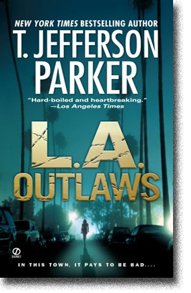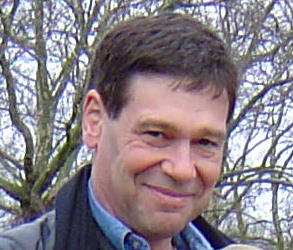SPANISH
BANDITS AND CHINESE DETECTIVES
T.
Jefferson Parker & Henry Chang
Two
novels for American eyes only
 I
jumped
at the chance to pick up a 'new' T. Jefferson Parker novel when I was
at the airport in New York recently, and as it turns out, it was a
good thing I did, because neither the book I bought, L.A.
Outlaws,
nor his subsequent Renegades,
has a UK publisher. This strikes me as being both unjust and amazing,
because Parker's had a string of impressive standalones (and the
three Lucy novels) published here, most notably 2005's California
Girls,
which was one of the two or three best crime novels of that year.
What interests me most about Parker is the way he's willing to take
risks; Fallen
could've been extremely gimmicky, but managed to avoid that fate, and
I have a similar feeling about Outlaws.
I
jumped
at the chance to pick up a 'new' T. Jefferson Parker novel when I was
at the airport in New York recently, and as it turns out, it was a
good thing I did, because neither the book I bought, L.A.
Outlaws,
nor his subsequent Renegades,
has a UK publisher. This strikes me as being both unjust and amazing,
because Parker's had a string of impressive standalones (and the
three Lucy novels) published here, most notably 2005's California
Girls,
which was one of the two or three best crime novels of that year.
What interests me most about Parker is the way he's willing to take
risks; Fallen
could've been extremely gimmicky, but managed to avoid that fate, and
I have a similar feeling about Outlaws.
Allison
Murrieta is a masked bandita who performs small armed robberies and
gives the proceeds to charity; she's claiming to be the descendant of
the legendary outlaw Joaquin Murietta, beheaded by a posse in 1853.
In reality, she's Suzanne Jones, a gorgeous school teacher who lives
in the countryside a long way from downtown LA. One night, about to
take down a sale of jewels, she witnesses an ambush and shootout
which leaves the stones with her, and a bad gangster on her tail.
Also on her tale is sheriff's deputy Charlie Hood, who is bedazzled
by Suzanne Jones and her muscle cars, and soon suspicious as well.
Where
Parker shines is in characterisation, and he does it here by
alternating between Suzanne/Allison in first person, and Charlie Hood
in third, which makes it easier for the reader to be carried away by
the pace of Suzanne's life of crime. You need to be carried away a
little, as Charlie himself is, because otherwise you might ask
yourself how, in the modern era of surveillance cameras and
computers, she's able to keep Charlie bamboozled enough to keep the
rest of the force off her back. But because the pace of the story is
so good, and the character so compelling, most readers will relax and
go with the flow.
Of
course it gets complicated: there are too many greedy people
involved, as is usually the case in jewel thefts, and Murietta may be
in over her head. Charlie is certainly in over his. But it is also to
Parker's credit that he resolves things with some flair, including a
bravura set-piece in a junkyard, but the ultimate resolution is the
kind of downbeat thing that smacks of realism, and more than
justifies whatever suspension of disbelief you may have felt
necessary to indulge Murietta's career. It's a superior piece of high
voltage action writing, a suspense thriller worthy of any on the
market, and it seems amazing to me that this is the book British
publishers would choose to leave untouched. By the way, Renegades
brings back Charlie Hood, who's an interesting study in
down-to-earth, not super-hero, cop, and I'm already looking forward
to that. It would be nice if I didn't have to go to America to read
it!
 Meanwhile,
another American writer as yet unpublished here is Henry Chang. I
picked up Chinatown
Beat
through the mail after a fulsome review by Ron Rosenbaum, much of
whose journalism I admire, but whose literary hyperbole I shall take
with a grain or two of NaCl in the future. Actually, that's unfair to
Chang, whose book is an interesting take on police procedural, and
has a fascinating setting, but whose strongest point is actually his
femme fatale character, a Chinese black widow worthy of any in
hard-boiled fiction. But what works best in Chinatown
Beat are
mostly familiar elements: the cop alienated from his childhood
friends, the lone cop fighting an indifferent police force, the
inscrutable workings of the old Chinese tongs and the extreme
violence of the boys coming up.
Meanwhile,
another American writer as yet unpublished here is Henry Chang. I
picked up Chinatown
Beat
through the mail after a fulsome review by Ron Rosenbaum, much of
whose journalism I admire, but whose literary hyperbole I shall take
with a grain or two of NaCl in the future. Actually, that's unfair to
Chang, whose book is an interesting take on police procedural, and
has a fascinating setting, but whose strongest point is actually his
femme fatale character, a Chinese black widow worthy of any in
hard-boiled fiction. But what works best in Chinatown
Beat are
mostly familiar elements: the cop alienated from his childhood
friends, the lone cop fighting an indifferent police force, the
inscrutable workings of the old Chinese tongs and the extreme
violence of the boys coming up.
Chang
tries to take us deeper into Chinatown, but much of the time that
seems to consist mostly of using Chinese words and phrases, quickly
translated. He often seems to back off his best confrontational
scenes, and to some extent his characters often seem sketched in, as
if with a calligraphic brush, rather than painted more deeply. This
is true particularly because, although this is the story of Mona,
abused mistress of Uncle Four, and her plans of revenge and getaway,
the story's suspense builds from her use of the chauffeur, Johnny
Wong, aka Wong Jai or Kid Wong. And, as is usually true in such
tales, it is the character of the male, the victim with the
half-track brain and the one-track mind, which is the crucial one,
and it is here in particular that more depth would help. The rest of
the problem is that Mona never gets to play face to face against the
main character, who is Chang's Chinese detective.
Jack
Yu is an interesting detective, but the blossoming of his own romance
somehow seems at odds not only with the story but with the
characters, not as much him as the lawyer lady he befriends. This was
the first in a series by Chang, and with Yu transferred out of
Chinatown as the story ends, there is more opportunity for conflict
with the world of the gwailo, or white devils, within the department
as well as in the wider world. He's a character who can be developed
further, and perhaps with a more confrontational, if less
interesting, villain, he will be.
LA
OUTLAWS
by T.
Jefferson Parker,
Dutton (US) 2008, Signet (US paperback) 2009
CHINATOWN
BEAT
by Henry
Chang,
Soho Press (US) 2006
|




 I
jumped
at the chance to pick up a 'new' T. Jefferson Parker novel when I was
at the airport in New York recently, and as it turns out, it was a
good thing I did, because neither the book I bought, L.A.
Outlaws,
nor his subsequent Renegades,
has a UK publisher. This strikes me as being both unjust and amazing,
because Parker's had a string of impressive standalones (and the
three Lucy novels) published here, most notably 2005's California
Girls,
which was one of the two or three best crime novels of that year.
What interests me most about Parker is the way he's willing to take
risks; Fallen
could've been extremely gimmicky, but managed to avoid that fate, and
I have a similar feeling about Outlaws.
I
jumped
at the chance to pick up a 'new' T. Jefferson Parker novel when I was
at the airport in New York recently, and as it turns out, it was a
good thing I did, because neither the book I bought, L.A.
Outlaws,
nor his subsequent Renegades,
has a UK publisher. This strikes me as being both unjust and amazing,
because Parker's had a string of impressive standalones (and the
three Lucy novels) published here, most notably 2005's California
Girls,
which was one of the two or three best crime novels of that year.
What interests me most about Parker is the way he's willing to take
risks; Fallen
could've been extremely gimmicky, but managed to avoid that fate, and
I have a similar feeling about Outlaws.
 Meanwhile,
another American writer as yet unpublished here is Henry Chang. I
picked up Chinatown
Beat
through the mail after a fulsome review by Ron Rosenbaum, much of
whose journalism I admire, but whose literary hyperbole I shall take
with a grain or two of NaCl in the future. Actually, that's unfair to
Chang, whose book is an interesting take on police procedural, and
has a fascinating setting, but whose strongest point is actually his
femme fatale character, a Chinese black widow worthy of any in
hard-boiled fiction. But what works best in Chinatown
Beat are
mostly familiar elements: the cop alienated from his childhood
friends, the lone cop fighting an indifferent police force, the
inscrutable workings of the old Chinese tongs and the extreme
violence of the boys coming up.
Meanwhile,
another American writer as yet unpublished here is Henry Chang. I
picked up Chinatown
Beat
through the mail after a fulsome review by Ron Rosenbaum, much of
whose journalism I admire, but whose literary hyperbole I shall take
with a grain or two of NaCl in the future. Actually, that's unfair to
Chang, whose book is an interesting take on police procedural, and
has a fascinating setting, but whose strongest point is actually his
femme fatale character, a Chinese black widow worthy of any in
hard-boiled fiction. But what works best in Chinatown
Beat are
mostly familiar elements: the cop alienated from his childhood
friends, the lone cop fighting an indifferent police force, the
inscrutable workings of the old Chinese tongs and the extreme
violence of the boys coming up.
